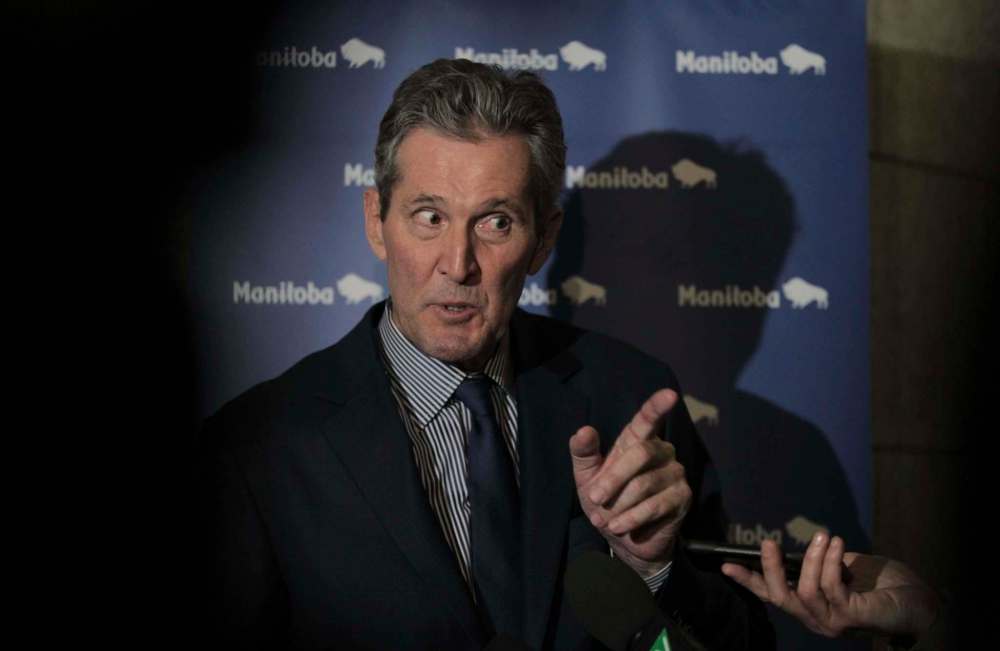Pallister’s op-ed shows a lack of accountability
Advertisement
Read this article for free:
or
Already have an account? Log in here »
To continue reading, please subscribe:
Monthly Digital Subscription
$0 for the first 4 weeks*
- Enjoy unlimited reading on winnipegfreepress.com
- Read the E-Edition, our digital replica newspaper
- Access News Break, our award-winning app
- Play interactive puzzles
*No charge for 4 weeks then price increases to the regular rate of $19.95 plus GST every four weeks. Offer available to new and qualified returning subscribers only. Cancel any time.
Monthly Digital Subscription
$4.99/week*
- Enjoy unlimited reading on winnipegfreepress.com
- Read the E-Edition, our digital replica newspaper
- Access News Break, our award-winning app
- Play interactive puzzles
*Billed as $19.95 plus GST every four weeks. Cancel any time.
To continue reading, please subscribe:
Add Free Press access to your Brandon Sun subscription for only an additional
$1 for the first 4 weeks*
*Your next subscription payment will increase by $1.00 and you will be charged $16.99 plus GST for four weeks. After four weeks, your payment will increase to $23.99 plus GST every four weeks.
Read unlimited articles for free today:
or
Already have an account? Log in here »
Hey there, time traveller!
This article was published 26/03/2018 (2848 days ago), so information in it may no longer be current.
It was an extraordinary glimpse into the mind of the man who leads the province.
After a week of political controversy, Premier Brian Pallister authored a commentary that was published in the March 24th edition of the Winnipeg Free Press. Such contributions are not unprecedented; the Free Press regularly makes space for political leaders to speak directly with the public. Even so, this piece was one of the most unusual ever penned by a first minister.
First, some context for his commentary.

Last week, nine of 10 members of the Manitoba Hydro board of directors resigned to protest against the very government that appointed them two years earlier. On the same day, the resignations became public, Pallister revealed that he had vetoed a $67.5-million settlement between Hydro and the Manitoba Metis Federation (MMF) that was designed to ensure a new transmission line to Minnesota would not be interrupted by a land claim or environmental challenge.
In his Free Press commentary, Pallister tried to explain what happened and what role he played in the drama. What we got was a somewhat alarming picture of just how muddled the premier’s thinking can be at times.
Pallister said the board’s resignation was triggered when his government killed the agreement with the MMF, a deal that set a “troubling” precedent, while providing no guarantee the Métis would not try to derail other projects, including a much-needed floodwater outlet for Lake Manitoba. And without completion of that outlet, Pallister said the province might have to spend “a billion dollars of taxpayers’ money” to cover flood-related costs.
Pallister’s reference to the Lake Manitoba flood channel was particularly confusing, given that the MMF has never suggested it would try to interrupt work on that project. Similarly confounding was the premier’s assertion that signing a deal on the Manitoba-Minnesota transmission line could somehow result in a billion dollars or more of flood costs.
The premier is correct on the first point. Theoretically, it is possible the MMF could make additional, future demands involving other government infrastructure projects. But to claim that a future, as-yet-unidentified MMF claim could cost the provincial treasury a billion dollars is a bizarre leap in logic.
Also confusing is the premier’s description of the events that led to the Hydro board’s resignation. Pallister wrote in his commentary that the resignations were a direct result of his decision to kill the deal with the MMF. In fact, the premier was already trying to get rid of the chair and some of the other board members prior to that decision.
Government sources have confirmed that Pallister had become fed up with Sanford Riley’s alarmist rhetoric about the precarious state of Hydro’s finances because of escalating debt levels. Riley had previously asked Pallister for a controversial “equity investment” — a cash infusion from general revenues — to help stabilize the utility’s debt-to-equity ratio. When Pallister refused, Riley then directed the utility to apply to the Public Utilities Board (PUB) for a series of 7.9 per cent rate increases, a strategy that caused the premier political grief.
When the PUB turned down the first of those requests last year, it was obvious that Riley and the board had become a political liability. Although the premier may want to lay the blame on the MMF deal, that was only one of a number of board decisions causing political headaches for the premier, and which put in motion the efforts to get rid of them.
Most troubling, however, is the complete lack of accountability in Pallister’s article.
The premier did not, for example, take any responsibility for the performance of the Hydro board. This was a group of supposedly like-minded citizens, many of whom were also prominent supporters of his own Progressive Conservative party. If, as the premier seems to think, they were not up to the task, then Pallister has to take the blame for appointing the wrong people.
There is a similar lack of accountability about the deal with the MMF.
Thanks to a 2016 Supreme Court decision, the Métis have a right to be consulted on land and resource development. Métis activists believe this opens the door to land claims, but to date, that theory has not yet been fully tested.
Métis groups have been negotiating some form of land claim with Ottawa for nearly two decades, compensation for a failure to properly execute land distribution to Métis people. The deal between Hydro and the MMF would have been among the first reached at the provincial level that acknowledge the right of Métis people to make similar claims.
In his commentary, however, Pallister wrote that Hydro “was using millions of ratepayer dollars to buy rights they had no right to buy, from a person who has no right to sell them.” If the premier doubts the right of Métis people to seek compensation for land claims, he had an obligation to make all that clear well before a formal agreement was reached.
In the final paragraph of his commentary, the premier argued that his only concern was protecting the interests of all Manitobans.
“When there is a conflict between an arm or an agency of government and the interests of all Manitobans,” the premier wrote, “this government will stand up for Manitobans every time.”
Remarkably, the premier seems to have forgotten that he is, in fact, the leader of that government. Yes, Hydro is an arm’s-length entity, but he is still ultimately accountable for all it does. We know that because Pallister has made it clear he believes the leaders of the former NDP government are fully accountable for any and all bad decisions made at Hydro under their watch.
The premier set out to write an article that demonstrated his deep commitment to protecting Manitobans. All he ended up demonstrating is that he has very little knowledge about, and control over, the very government he claims to lead.
dan.lett@freepress.mb.ca

Dan Lett is a columnist for the Free Press, providing opinion and commentary on politics in Winnipeg and beyond. Born and raised in Toronto, Dan joined the Free Press in 1986. Read more about Dan.
Dan’s columns are built on facts and reactions, but offer his personal views through arguments and analysis. The Free Press’ editing team reviews Dan’s columns before they are posted online or published in print — part of the our tradition, since 1872, of producing reliable independent journalism. Read more about Free Press’s history and mandate, and learn how our newsroom operates.
Our newsroom depends on a growing audience of readers to power our journalism. If you are not a paid reader, please consider becoming a subscriber.
Our newsroom depends on its audience of readers to power our journalism. Thank you for your support.
History
Updated on Monday, March 26, 2018 7:16 AM CDT: Updates
Updated on Tuesday, March 27, 2018 10:22 AM CDT: Fixes type




